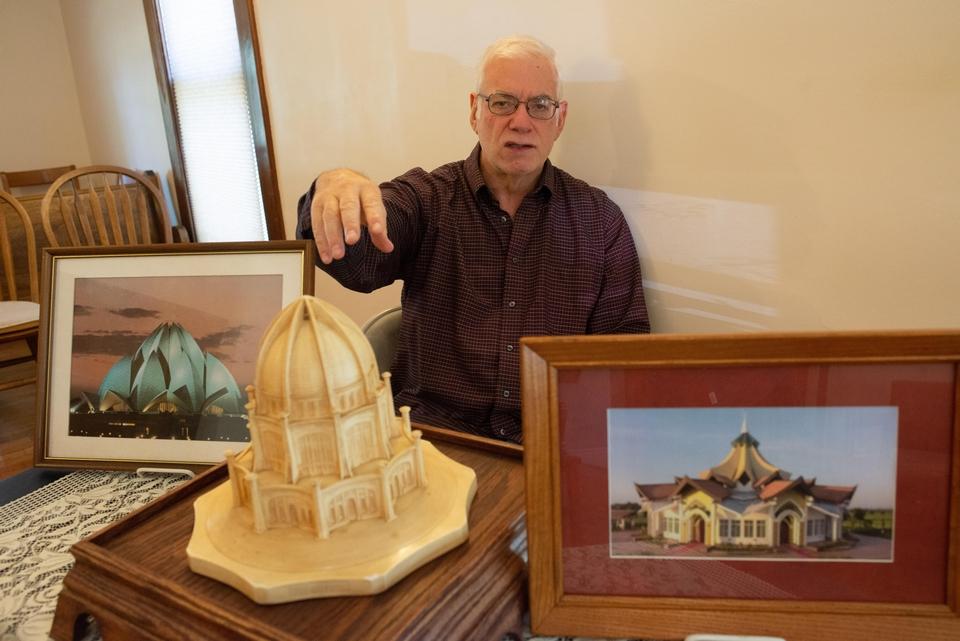
|
|
Abstract: Overview of the Bahá'í Faith and its activities in Kansas, and interview with Duane Herrmann. Notes: |
 click for larger photo Duane L. Herrmann, author and local leader in the Baháí faith, explains the scale of a model of the Bahá'í House of Worship in Wilmette, Ill. Friday afternoon at the Topeka Friends Meeting place at 603 SW 8th St. |
 click for larger photo Herrmann talks about different Bahá'í House of Worships, one model in Wilmette, Ill., a photo of The Lotus Temple in New Delhi, India, left, and a newer one built in Battambaug, Cambodia, right, Friday afternoon at the Topeka Friends Meeting place at 603 SW 8th St. |
A small, local brotherhood of Bahá'í worshipers is working to make a difference in the area and around the world.
A few dozen Bahá'ís in Shawnee County meet virtually to encourage each other and to discuss their impact in the community. They embrace concepts and teachings from several of the major world religions, focus on positive solutions to local problems and support their fellow Bahá'ís around the world who experience intolerance and persecution.
Though they are small in number locally, Bahá'ís are active in the community, particularly in interfaith projects promoting racial harmony.
The emphasis on racial unity of the Bahá'í faith makes it particularly poignant as the United States grapples with social issues. The Bahá'í faith is considered to be among the world's most geographically diverse religions. The Bahá'í faith claims an estimated 7.3 million adherents worldwide in 221 countries, in some 120,000 localities.
One of the leading local voices for the Bahá'í faith, Duane Herrmann, has written several books and articles and numerous poems explaining and celebrating his faith. Herrmann plays an active role in connecting people of diverse racial, ethnic and religious backgrounds.
"One of our foundational teachings is that the human race is one race, and that we have to overcome the past," Herrmann said. "Any action that can bring races together is a good thing to do. We've never had a race problem in Topeka in the Bahá'í community. It's always been an integrated community. It's always worked together."
Herrmann can be found attending a Koran class one day, then praying with Quakers the next. He said his personal mission is building bridges between groups of people. Among the many roles he has played in the local community, he has been involved with Interfaith of Topeka, The Topeka Center for Peace & Justice and the Living the Dream planning committee.
Herrmann said his involvement with Living the Dream illustrates the beauty of tolerance and cooperation in Topeka. Last January, Herrmann was selected by Imam Omar Hazim to fill his role in a Martin Luther King Day celebration ceremony.
"That was so surprising that it was put in the national Bahá'í newsletter, because worldwide Muslims don't do that," Herrmann said. "For a Muslim to do that was so amazing, and it's because we have been friends since 1979. That couldn't happen in very many places."
Herrmann said Bahá'ís aren't always treated with understanding in the Topeka area. But he admits that in comparison to the mistreatment Bahá'ís face around the world, tolerance of religious diversity is one of Topeka's strengths.
"I feel very fortunate here that we're able to meet each other as equals," Herrmann said. "We have developed friendships and relationships and know that we can trust each other. That is not the case everywhere. Some Bahá'í refugees who move here don't truly believe that it's possible for them to mention that they are Bahá'í without some repercussion or retaliation.
"All their life they've known 'Don't say it.' And here they can, and it's just too unreal to them."
Herrmann said that while COVID-19 has interrupted the worship services of most religious organizations, the local Bahá'ís haven't been affected to as great an extent. Rather than weekly gatherings, Bahá'ís hold what are called 'Nineteen Day Feasts,' which were converted to virtual meetings in the spring. Herrmann said members joke about getting something from the refrigerator to substitute for their feasts while meeting online.
"We simply couldn't share refreshments or hugs," Herrmann said. "All else proceeded the same.
"Bahá'ís do not function as a congregation. That is the most surprising difference people find. The most congregational-kind of events we have are holy day observances, and they are more like parties than any church service. Some are more somber because of the death they commemorate, but we still enjoy getting together and sharing food."
Apart from the group gatherings every 19 days, Topeka-area Bahá'ís frequently gather in small-group fellowships. They also offer educational programs and materials for youth. Most of those were able to continue in some fashion throughout the pandemic.
"Every Bahá'í carries more responsibility for the functioning of the Bahá'í community than a typical church-goer," Herrmann said. "Because we don't follow a liturgy, or any kind of outline, it can look like we have no program at all, but we do. It's just that there are wide possibilities."
Its name derived from the Arabic word for "glory" or "splendor," the Bahá'í faith teaches God is a single, all-powerful being. It incorporates the teachings of religious founders Abraham, Buddha, Jesus, Krishna, Moses, Muhammad, Zoroaster, as well as revelations by Bahá'u'lláh, the father of the Bahá'í religion.
Herrmann serves as public information officer for both the Bahá'í community of Topeka and of Shawnee County. His writings are published in 12 countries, in four different languages. He calls his Bahá'í-inspired science fiction novel about a diverse group of humans populating a new planet his most exciting project.
"It's my being," Herrmann said. "I can't imagine myself not writing. Before I knew the alphabet, I wanted to make stories.
"Through my writing, I want to share my perspective and to draw people closer to God and to a more spiritual frame of reference. Life is more about spirit than it is about physical things."
|
|